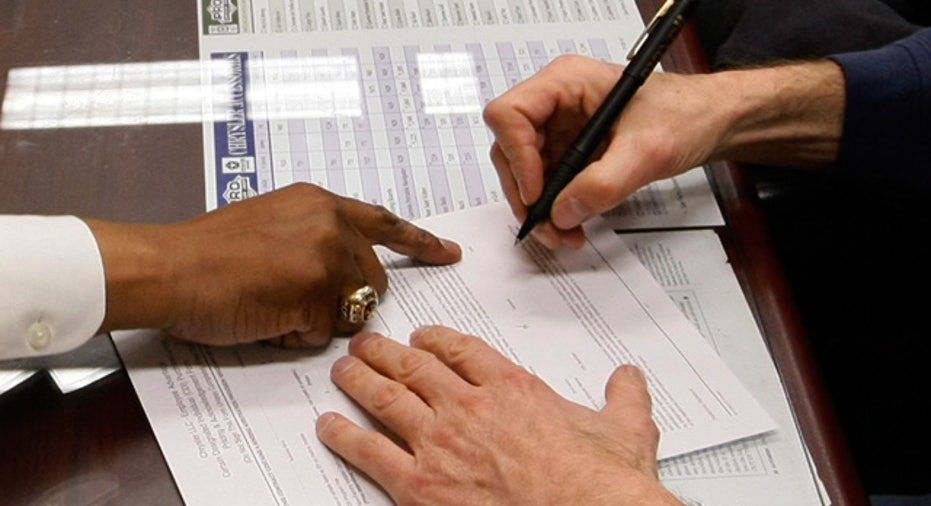Auto Dealers Push Back Against New Fuel Rules

U.S. auto dealers are working to undo the Obama administration's fuel efficiency agenda, replacing car companies that for years kept such mandates at bay with the help of allies in Congress.
The car industry is facing dramatic new standards that would double efficiency targets to 54 miles per gallon by 2025, under an administration plan unveiled in July and set to be officially proposed in the coming weeks.
Automakers have traditionally carried the torch for modest fuel efficiency mandates, arguing that aggressive targets could drive up vehicle cost, compromise safety, and limit consumer choice.
But car executives agreed to the ambitious targets during negotiations this spring, going along with an administration that rescued the U.S. industry from collapse in 2009. General Motors and Chrysler owe their continued existence to Obama, and taxpayers still own a third of GM.
Virtually all big automakers reluctantly agreed to the 2025 deal in the talks led by the White House, leaving dealers on their own to fight the new standards.
``This is a big jump, and we'd like to slow this process down and find out what's working and what's not,'' said Dave Westcott, who operates two North Carolina showrooms and is an executive with a trade group behind the delay effort. ``We'd like the public to be in control of what they would like.''
Dealers are backing a Republican measure that would remove the influence of federal environmental regulators and the state of California in establishing national mileage standards.
Dealers are also weighing a lawsuit if legislative efforts tied to a spending bill in the Republican-controlled House fail. So far, there is no companion proposal in the Senate, which is led by Democrats who are aligned with Obama on the issue.
President Barack Obama has championed higher auto fuel efficiency as the single most important step the United States can take to reduce its dependence on foreign oil. It will also cut emissions of greenhouse gases.
Environmental groups have appealed to the National Automobile Dealers Association to drop their objections, pointing out that a number of carmakers offer exceptionally efficient vehicles that are also popular with consumers.
PRICE-SENSITIVE CONSUMERS
Fuel economy politics have become more complicated with the recent introduction of the Environmental Protection Agency in federal rulemaking. California is an additional complication, with its desire to set its own regulations in its huge market.
Dealers want to return to when the Department of Transportation alone set fuel targets. For 30 years the standards went up incrementally, if at all, due mainly to the political muscle of automakers.
Auto dealers believe the recent White House agreement -- which they were excluded from -- bullies business and consumers.
They and other industry insiders complain it exceeds a reasonable embrace of hybrid and electric-engine technologies that have been slow to catch on with average car buyers.
Hybrids make up less than 3 percent of the overall U.S. sales market. And first-year sales of electric and mostly electric cars only made up only 0.12 percent of the 9.4 million cars and trucks sold overall through September of this year.
Jeremy Anwyl, chief executive of buyer research group Edmunds.com, said the gradual improvement in fuel efficiency standards over the past decade enabled carmakers to introduce hybrids and other technologies while maintaining quality.
He said the accelerated standards risk a repeat of quality and reliability problems in the late 1970s and early 1980s when environmental and safety regulations converged on the industry.
Dealers also complain that the higher costs of new technology will suppress sales as the struggling economy makes buyers more price sensitive.
For the 2012-2016 standards finalized last year, that culminate in an average fleet efficiency of 35 mpg, regulators estimate an average cost increase to consumers of $950.
``With the economy now, customers are so price sensitive,'' said Forrest McConnell, who owns Honda and Acura franchises in Alabama. ``There is no problem with going up (in mpg) but it's a balancing act.''
A White House spokesman, asked to comment for this story, did not address dealer complaints specifically, but said the that negotiated agreement underpinning the new fuel rules had the support of more than a dozen U.S. and overseas automakers.
BIG-DOLLAR DONATIONS
Dealers are embedded in their communities, are significant employers, and are barometers of economic health on the local level. They also represent the biggest source of campaign cash within the transportation industry, according to the Center for Responsive Politics.
The National Automobile Dealers Association ranks No. 19 overall on the CRP's list of ``heavy hitter'' contributors.
Dealers gave $2.6 million to candidates and political committees in the 2010 election cycle and historically favor Republicans. Donations for the 2012 campaign cycle have gone to Republicans by a 2 to 1 margin.
House Speaker John Boehner spoke to the dealers' association last month in Washington after which hundreds of members accelerated their lobbying. Rank and file Republicans also support efforts to upend fuel rules.
More than 60 members of the House wrote to Appropriations Committee Chairman Harold Rogers and Interior and Environment Subcommittee Chairman Michael Simpson last week supporting the legislative initiative.
The amendment to spending legislation would affect EPA's ability to work on fuel economy through September 2012, the end of the current fiscal year.
Such a strategy, if it becomes law, could kill the new regulation if Obama loses reelection to a Republican candidate inclined to drop the effort. Otherwise, high visibility pressure keeps the issue in the spotlight with the rule proposal under consideration.
Bailey Wood, the legislative affairs chief of the dealer group representing nearly 17,000 showrooms, said membership would concentrate for now on getting the House measure passed.



















